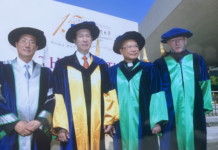International Review of Research in Open and Distance Learning (http://www.irrodl.org) is broadcasting a Call for Proposals for a theme issue entitled: “Trends and Issues in Open and Distance Learning in Africa,” co-edited by Dr. Rashid Aderinoye and Dr. Richard Siaciwena.
Publication target date: December 2009
CALL FOR PROPOSALS
October 1, 2008: Send an outline of proposal (500-700 words) to irrodl@athabascau.ca
November 1, 2008: Notification of Acceptance of Proposals
INVITED PAPERS
March 30, 2009: full length papers due (20 – 35 pages, double-spaced)
October 15, 2009: Peer Review and revisions finished
October 15, 2008 – December 2009. Copy and production editing
RATIONALE FOR THE REGIONAL FOCUS ISSUE ON AFRICA
Education is widely recognized as central to sustainable economic and social development. African countries, however, face tremendous challenges vis-à-vis other geographies and regions. Rapidly increasing demands for all levels and forms of education, coupled with local and regional governments’ limited capacity to expand provision of education through traditional bricks-and-mortar institutions, leaves open and distance learning (ODL) as a viable option to address and match growing demand.
Since the early 1960s, ODL has enabled African countries to provide relatively inexpensive forms of access to formal education. For instance, ODL has traditionally provided second-chances for school leavers (dropouts), and opportunities for those who wish to enter the formal education system to upgrade their skills and knowledge. Further, in recent years ODL scholars have been aiming to improve the quality of distance instruction, which in turn, raises the basic living standard in all sectors of African society.
Prior to the 21st century, distance education programmes in Africa were mainly confined to formal education equivalency courses (i.e., at secondary and territory levels), and a handful of non-formal education courses in agriculture and health. Today, however, there is an encouraging trend towards diversifying distance delivery programmes. ODL is increasingly being used to deliver specialty courses and programmes of study in agriculture, healthcare (e.g., HIV/AIDS awareness and prevention), good governance, environmental stewardship, and business and entrepreneurship training. ODL, in short, is being used as a means for reducing poverty levels through the development of human resource capacity.
In spite of ODL’s success in Africa, a number of issues that remain to be addressed.
Lack of political support and legitimacy. Lack of understanding about both the potential and limitations of ODL is widespread in many African countries. Harboring the belief that ODL cannot possibly offer the same quality of education as conventional campus-based education, many African educational policymakers and planners remain skeptical about the legitimacy and quality of ODL. Such misunderstandings can be attributed to, among other reasons, a lack of an adequate ODL research needed to support informed decisions and policy choices.
Policy issues: Dhanarajan (2004, p. xi) observed that “it is becoming clear that where there are clear and unambiguous policy directives governing the application of open and distance learning, sustainability and success have been remarkable; and where these were not there, failures have been high.” Most African countries, however, lack policies needed to guide the development and implementation of ODL programmes at national and institutional levels.
Inadequate capacity: Lack of infrastructure and professional competencies in ODL remain important barriers. In many African countries there is a dire shortage of qualified staff required for guiding and influencing the development of ODL policies and for planning, developing, managing, and evaluating ODL programmes. Indeed, few training opportunities exist for staff and specialized ODL training centres exist in only a few countries.
In addition, most ODL institutions are handcuffed by financial constraints. ODL budgets in many cases is quite small. As Kinyanjui (1998, p. 3) observed “…many distance education institutions in Africa have been started without adequate funding and their rapid growth and expansion outstrip the available resources, and as a result they have been unable to maintain both the quantity and quality of their services as well as the efficiency of their operations.”
While information and communication technologies (ICT) has been used to expand the provision of ODL throughout the world, many African countries and their educational systems lack adequate information and communication infrastructures.
Sustainability: Many ODL programmes fail because they are not fully integrated into mainstream education systems. As a result, ODL programmes tend not attract the political support required for successful their implementation. For example, there are many foreign donor-funded ODL projects in Africa, which tend to collapse after donor support ends or is withdrawn.
Africa faces huge socio-economic challenges. Moreover there is a “increasing recognition and acceptance that education may be the only way to ensure sustainability of communities and nations as healthy, vibrant and functioning societies and democracies, and for individuals to escape from the viciousness of poverty”(Dhanarajan, 2002). Achieving ‘Education for All’ (EFA) goals and the Millennium Development Goals (MDG) is a daunting task that requires, among other initiatives, the use of ODL.
The good news is that there are many successful ODL programmes across the continent and there are efforts underway that aim to address the challenges of development.
Through the use of ‘case studies’ and ‘research’, this Regional Theme issue of IRRODL aims to describe and analyze current trends and issues in ODL in Africa. It will seek to detail the actual and potential contribution of ODL to social and economic development in Africa, and it will do so by revealing the challenges and obstacles to ODL’s optimal effectiveness, efficiency, quality assurance. As such, we seek proposals from a broad range of topics and sub-themes:
1. Models of ODL
• Single mode institutions
• Dual Mode Institutions
• Decentralized and collaborative delivery systems
• Consortia
• Other institutional structures/ arrangements
2. Widening access to education through ODL
• Open Schooling
• Tertiary education
• Technical education and vocational training
• Contribution to EFA goals
• Contribution to MDG goals
3. Teacher education
• Pre-service training by ODL
• In-service teacher training by ODL
4. ODL for national development
• ODL for improving governance systems (such as training of local government personnel and those involved in promoting and enforcing human rights)
• Agricultural education
• Livelihoods for development
• Entrepreneurship
• Environmental education
• Health education, including HIV/AIDS
• Literacy
• Non-formal education
5. Issues in the management of ODL
• Policy issues
• Learner-support services
• Quality assurance
• Financing ODL
• Application of information and communication technologies in ODL
• Monitoring, research and evaluation
• e-Learning in Africa
• Private participation in ODL
Co-Editors, Rashid Aderinoye and Richard Siaciwena
—
Paula Smith – Manager
Canadian Institute for Distance Education
Research (CIDER) http://cider.athabascau.ca
Managing Editor
International Review of Research
in Open and Distance Learning (IRRODL)
www.irrodl.org
Athabasca University @ Edmonton
1200, 10011 – 109th Street, Edmonton
CANADA T5J 3S8
Phone: 1.780.421.2536 Fax: 1.780.497.3416
E-mail: paulah@athabascau.ca









 Dr. Tony Bates is the author of eleven books in the field of online learning and distance education. He has provided consulting services specializing in training in the planning and management of online learning and distance education, working with over 40 organizations in 25 countries. Tony is a Research Associate with Contact North | Contact Nord, Ontario’s Distance Education & Training Network.
Dr. Tony Bates is the author of eleven books in the field of online learning and distance education. He has provided consulting services specializing in training in the planning and management of online learning and distance education, working with over 40 organizations in 25 countries. Tony is a Research Associate with Contact North | Contact Nord, Ontario’s Distance Education & Training Network.

